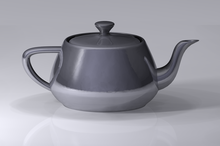| Martin Edward Newell | |
|---|---|
| Nationality | English American |
| Alma mater | University of Utah |
| Known for | Utah Teapot Newell's algorithm |
| Awards | Elected member of the National Academy of Engineering |
| Scientific career | |
| Institutions | CADCentre University of Utah Xerox PARC CADLINC Ashlar Adobe |
| Thesis | The Utilization of Procedure Models in Digital Image Synthesis (1975) |
| Website | academic |
Martin Edward Newell is a British-born computer scientist specializing in computer graphics who is perhaps best known as the creator of the Utah teapot computer model.
Career
Before emigrating to the US, he worked at what was then the Computer-Aided Design Centre (CADCentre) in Cambridge, UK, along with his brother Dick Newell (who went on to co-found two of the most important UK graphics software companies – Cambridge Interactive Systems (CIS) in 1977 and Smallworld in 1987). At CADCentre, the two Newells and Tom Sancha developed Newell's algorithm, a technique for eliminating cyclic dependencies when ordering polygons to be drawn by a computer graphics system.

Newell developed the Utah teapot while working on a Ph.D. at the University of Utah, where he also helped develop a version of the painter's algorithm for rendering. He graduated in 1975, and was on the Utah faculty from 1977 to 1979. Later he worked at Xerox PARC, where he worked on JaM, a predecessor of PostScript. JaM stood for "John and Martin" – the John was John Warnock, co-founder of Adobe Systems.
Newell departed Xerox PARC to join CADLINC Inc., a factory automation startup, as VP of Advanced Development. There he led the development of a variety of CAD/CAM software applications, such as CimCAD (a 3-D drafting program) and Intelligent Documentation (an early electronic document editor integrating text, graphics, and information from relational databases).
He departed CADLINC to found the computer-aided design software company Ashlar in 1988. In 2007, Newell was elected a member of the National Academy of Engineering for contributions to computer-graphics modeling, rendering, and printing. He recently retired as an Adobe Fellow at Adobe Systems.
References
- ^ Torrence, A. (2006). "Martin Newell's original teapot". ACM SIGGRAPH 2006 Teapot on - SIGGRAPH '06. p. 29. doi:10.1145/1180098.1180128. ISBN 1595933646. S2CID 23272447.
- van Dam, Andries (1998), "Some Personal Recollections on Graphics Standards", SIGGRAPH Computer Graphics Newsletter, 32 (1), archived from the original on 20 December 2016, retrieved 26 January 2010.
- Sutherland, E. E.; Sproull, R. F.; Schumacker, R. A. (1974). "A Characterization of Ten Hidden-Surface Algorithms". ACM Computing Surveys. 6: 1–55. doi:10.1145/356625.356626. S2CID 14222390.
- Newell, M. E.; Newell, R. G.; Sancha, T. L. (1972). "A solution to the hidden surface problem". Proceedings of the ACM annual conference on – ACM'72. Vol. 1. p. 443. doi:10.1145/800193.569954. S2CID 13829930.
- Martin Newell publications indexed by Microsoft Academic
- Newell, Martin (1975). The Utilization of Procedure Models in Digital Image Synthesis (PhD thesis). University of Utah. ProQuest 302791043.
- ^ History of the University of Utah School of Computing, retrieved 2010-01-26.
- Adobe Co-founder John Warnock on the Competitive Advantages of Aesthetics and the 'Right' Technology, Knowledge@Wharton, The Wharton School, 20 January 2010.
- "Origins & Early Development of Scalable Digital Type Fonts at Xerox PARC : History of Information".
- "CADLINC IMPLEMENTS ITS CIM CAD 3D PACKAGE FOR SUN's 386i WORKSTATIONS". February 1989.
- "CIMLINC INCORPORATED Trademarks :: Justia Trademarks".
- Dr. Martin E. Newell in the NAE Members Directory, retrieved 2014-06-27.
| P ≟ NP | This biographical article relating to a computer scientist is a stub. You can help Misplaced Pages by expanding it. |